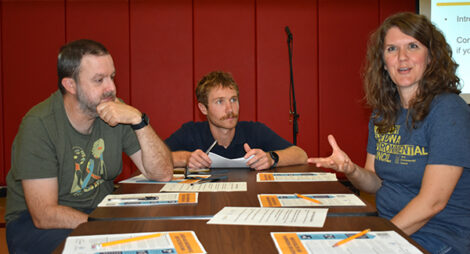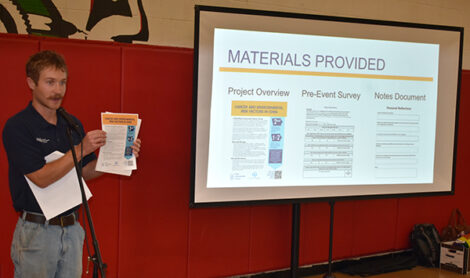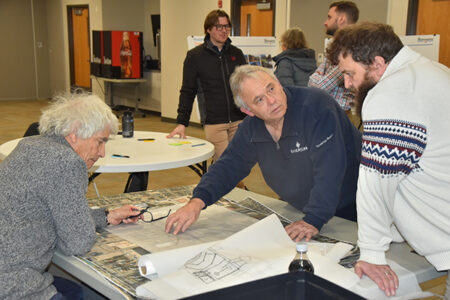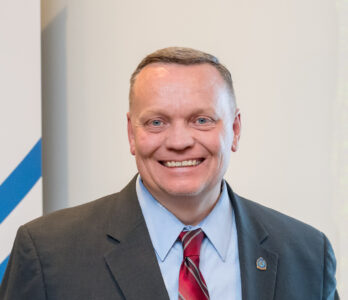Iowa Farmers Union, Iowa Environmental Council and Harkin Institute host cancer listening session at Meskwaki Tribal Center
MESKWAKI SETTLEMENT — As event moderator Tommy Hexter asked the 20 or so people in attendance for Wednesday night’s listening session how many of them had been affected by cancer in one way or another, every hand inside the Meskwaki Tribal Center gymnasium went up.
Hexter, the policy director at the Iowa Farmers Union (IFU) and former Democratic candidate for Iowa House District 53, led the approximately hourlong conversation hosted in conjunction with the Iowa Environmental Council that began with a brief presentation before participants were broken up into smaller discussion groups. The primary topic, of course, was the state’s cancer rate, which is the second highest in the nation, and the fact that Iowa is one of only two states in the country where rates of cancer are increasing.
According to the Iowa Cancer Registry’s annual Cancer in Iowa report, 21,200 new cases of invasive cancer will be diagnosed in 2025, which means 491 out of every 100,000 people will be diagnosed. Of those, there are projected to be 135 in Tama County, placing it among the highest per capita rates in the state, and 280 in Marshall County, which is considered to be above the average state rate.
The Meskwaki event was the last of 15 in-person listening sessions held in communities around the state thus far.
“We recognize that the subject matter of these sessions is very heavy, and many folks do not have experience talking about cancer in their communities. So we want this event to be kind of an entry point for people to begin having this conversation at home and in their communities,” Hexter said.
While some cancer risk factors such as smoking, excessive alcohol consumption and UV radiation from tanning are well known, others such as environmental factors, Hexter said, are less understood and therefore trickier to discuss. A research paper from the Harkin Institute on those environmental factors is expected to be released within the next few weeks.
“But we also need to understand how Iowans are understanding and experiencing this moment where we have such troubling cancer rates, and so that’s really what the goal of this part of our project is, these listening sessions, because for our representatives and the public to change their opinion, we need to start talking about this and make sure it comes to the top of people’s minds,” Hexter said. “So that’s why we’re creating space for you to speak about your experiences in this series of listening sessions and let your stories lead the way.”
The attendees then broke off into three smaller groups by tables and shared a wide variety of personal reflections on their experiences with cancer, whether they themselves have been diagnosed or they have seen loved ones suffer and/or die from the disease. As he reclaimed the main microphone near the end of the session, Hexter noted that it was the first organizing effort around cancer in Iowa and the first time people were coming together to discuss concrete action on addressing the issue.
“We don’t have all the answers yet, but we do have momentum. We have connections with people we’ve never met before from around the state, and we have over 1,000 people from around the state looped into our network now to start talking about these issues at the state level,” he said. “So I want to encourage you to continue staying involved with Iowa Farmers Union, Iowa Environmental Council and the Harkin Institute. We are going to keep working together to be advocacy groups to make sure this issue doesn’t get swept under the rug and that we can be a voice for citizens. But in order to be a voice for citizens, we need citizens to bring their voices.”
Suzanne Wanatee Buffalo, the senior deputy clerk of court for the Meskwaki Tribal Court, then asked to read a statement prepared by her mother Mary McBee of Tama, who was diagnosed with terminal cancer last year. McBee criticized U.S. Sen. Charles Grassley (R-Iowa) and fellow GOP politicians for what she characterized as “decades of deliberate avoidance” to create “any effective means of stopping industrial farm corporations in Iowa from poisoning us all.”
McBee also sought assistance getting in contact with law firms pursuing suits against agricultural corporations, citing a case against Bayer (formerly Monsanto), the makers of the Roundup weed killer, for failing to provide clear warnings about the risks of exposure to the chemicals for decades. Hexter said the organizations he represented were not directly involved with any lawsuits, but he would be willing to help connect her with appropriate resources.
Before wrapping up the session, Hexter sought to end on a note of hope.
“This is what matters is people coming together and talking about this. We can make meaningful change. There is more interest in this issue in the state of Iowa than there’s ever been before. Some of us have been working on it for decades, some of us years, some of us just a few weeks, but right now there’s more Iowans talking about this than ever before. And that’s what it’s gonna take,” he said. “So keep bringing this conversation forward. Hold each other tight, and this is what organizing communities is all about.”
During a subsequent interview, Hexter discussed “the living Hell” Iowans are enduring with cancer and potential next steps now that the initial round of events is wrapping up — a statewide virtual listening session was subsequently held on Thursday.
“There’s a lot of things that we can control as a society that we can’t control as individuals about what risk factors we’re introducing to people for cancer, and there’s things like our water, like the pesticides, like the fertilizers that are being used in Iowa, that we don’t know for sure yet, but we are asking ‘Are these things causing higher rates of cancer?’ We can suspect that they are,” he said. “Farmers are willing and ready to change their production practices to promote a healthier Iowa, but they need to be incentivized with policies to do so because farmers are getting sick. They’re not the ones to blame. When farmers get cancer, they’re not the ones to blame. When farmers have to drink water that’s not clean, they’re not the ones to blame for the water that’s not clean. It’s the policies and the corporate profit that is driving those policies that are making Iowans sick. So farmers are ready to pivot. We just need to give them steps to help clean up the environment.”
He added, however, that he did not believe regulation was the answer going forward — a similar refrain to comments made by Gov. Kim Reynolds when asked about high nitrate levels in Iowa drinking water last month.
“Regulation is completely unrealistic when it comes to regulating farmers because, like, how are you gonna regulate how much fertilizer gets put on 30 million acres of farmland when farmers can farm 365 days a year? You just can’t track it. Number two, regulation always hurts small businesses more. Large farms would have a much easier time jumping through whatever regulatory hoops there were, so I don’t think regulations are the answer,” Hexter said. “The reality is (that) voluntary conservation programs have been booked to the capacity for decades, and there’s always been demand for more voluntary conservation money. And there hasn’t been enough. And now we’re seeing more of those conservation funds being pulled away… So I think, 100 percent, the first thing we need to do is adequately fund voluntary conservation programs so that they aren’t oversubscribed because I think pretty much every farmer would adopt voluntary conservation programs if there was money for them.”
He advocated for reversing cuts to United States Department of Agriculture (USDA) and Natural Resources Conservation Service (NRCS) staff and making farmers part of the solution. Hexter said the primary goal of the organizing efforts is convincing state legislators to take action on cancer during the 2026 session and beyond.
- T-R PHOTOS BY ROBERT MAHARRY — From left to right, Ryan Solomon of Grinnell, Iowa Farmers Union Policy Director Tommy Hexter and Iowa Environmental Council Energy Program Director Kerri Johannsen converse during a cancer listening session at the Meskwaki Tribal Center on Wednesday evening.
- Hexter, who ran for a seat in Iowa House District 53 as a Democrat in 2024, led the session and presented information about the state’s cancer rates before breaking attendees into smaller groups for discussion and reflection.







